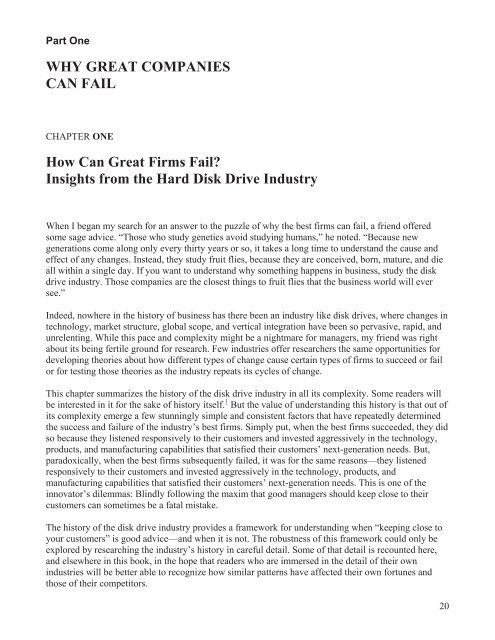PRUEBAS
PRUEBAS
PRUEBAS
You also want an ePaper? Increase the reach of your titles
YUMPU automatically turns print PDFs into web optimized ePapers that Google loves.
Part OneWHY GREAT COMPANIESCAN FAILCHAPTER ONEHow Can Great Firms Fail?Insights from the Hard Disk Drive IndustryWhen I began my search for an answer to the puzzle of why the best firms can fail, a friend offeredsome sage advice. “Those who study genetics avoid studying humans,” he noted. “Because newgenerations come along only every thirty years or so, it takes a long time to understand the cause andeffect of any changes. Instead, they study fruit flies, because they are conceived, born, mature, and dieall within a single day. If you want to understand why something happens in business, study the diskdrive industry. Those companies are the closest things to fruit flies that the business world will eversee.”Indeed, nowhere in the history of business has there been an industry like disk drives, where changes intechnology, market structure, global scope, and vertical integration have been so pervasive, rapid, andunrelenting. While this pace and complexity might be a nightmare for managers, my friend was rightabout its being fertile ground for research. Few industries offer researchers the same opportunities fordeveloping theories about how different types of change cause certain types of firms to succeed or failor for testing those theories as the industry repeats its cycles of change.This chapter summarizes the history of the disk drive industry in all its complexity. Some readers willbe interested in it for the sake of history itself. 1 But the value of understanding this history is that out ofits complexity emerge a few stunningly simple and consistent factors that have repeatedly determinedthe success and failure of the industry’s best firms. Simply put, when the best firms succeeded, they didso because they listened responsively to their customers and invested aggressively in the technology,products, and manufacturing capabilities that satisfied their customers’ next-generation needs. But,paradoxically, when the best firms subsequently failed, it was for the same reasons—they listenedresponsively to their customers and invested aggressively in the technology, products, andmanufacturing capabilities that satisfied their customers’ next-generation needs. This is one of theinnovator’s dilemmas: Blindly following the maxim that good managers should keep close to theircustomers can sometimes be a fatal mistake.The history of the disk drive industry provides a framework for understanding when “keeping close toyour customers” is good advice—and when it is not. The robustness of this framework could only beexplored by researching the industry’s history in careful detail. Some of that detail is recounted here,and elsewhere in this book, in the hope that readers who are immersed in the detail of their ownindustries will be better able to recognize how similar patterns have affected their own fortunes andthose of their competitors.20


